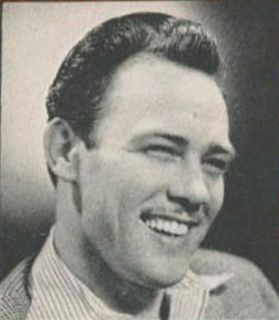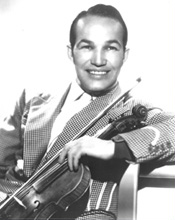
Yodeling is a form of singing which involves repeated and rapid changes of pitch between the low-pitch chest register and the high-pitch head register or falsetto. The English word yodel is derived from the German word jodeln, meaning "to utter the syllable jo". This vocal technique is used in many cultures worldwide.
Western swing music is a subgenre of American country music that originated in the late 1920s in the West and South among the region's Western string bands. It is dance music, often with an up-tempo beat, which attracted huge crowds to dance halls and clubs in Texas, Oklahoma and California during the 1930s and 1940s until a federal war-time nightclub tax in 1944 contributed to the genre's decline.
While the music of Oklahoma is relatively young, Oklahoma has been a state for just over 100 years, and it has a rich history and many fine and influential musicians.
Western music is a form of country and hillbilly music composed by and about the people who settled and worked throughout the Western United States and Western Canada. Western music celebrates the life of the cowboy on the open ranges, Rocky Mountains, and prairies of Western North America. Directly related musically to old English, Irish, Scottish, and folk ballads, also the Mexican folk music of Northern Mexico and Southwestern United States influenced the development of this genre, particularly corrido, ranchera, New Mexico and Tejano. Western music shares similar roots with Appalachian music, which developed around the same time throughout Appalachia and the Appalachian Mountains. The music industry of the mid-20th century grouped the two genres together under the banner of country and western music, later amalgamated into the modern name, country music.
The Maddox Brothers and Rose, known as America’s Most Colorful Hillbilly Band from the 1930s to the 1950s, consisted of four brothers, Fred, Cal, Cliff, and Don Maddox, along with their sister Rose. Cliff died in 1949 and was replaced by brother Henry. The group disbanded in 1956.

George and Leslie York, known professionally as The York Brothers, were an American country music duo, popular from the late 1930s through the 1950s, known for their close harmony singing. Their country boogie style, a precursor to rockabilly, combined elements of hillbilly, jazz, and blues music. Although originally from Kentucky, they are often associated with the city of Detroit, where they were based for several years, and which they paid tribute to in songs such as "Hamtramck Mama", "Detroit Hula Girl", and "Motor City Boogie".
Overton Vertis "O. V." Wright was an American singer who is generally regarded as a blues artist by African American fans in the Deep South; he is also regarded as one of Southern soul's most authoritative and individual artists. His best known songs include "That's How Strong My Love Is" (1964), "You're Gonna Make Me Cry" (1965), "Nucleus of Soul" (1968), "A Nickel and a Nail" (1971), "I Can't Take It" (1971) and "Ace of Spades" (1971).
This is a list of notable events in country music that took place in the year 1946.
This is a list of notable events in country music that took place in the year 1945.

Herbert Clayton Penny was an accomplished banjo player and practitioner of Western swing. He worked as a comedian best known for his backwoods character "That Plain Ol' Country Boy" on TV with Spade Cooley. He was married to country singer Sue Thompson from 1953–63.
"Steel Guitar Rag" is the seminal Western swing instrumental credited with popularizing the steel guitar as an integral instrument in a Western band.
"Shame on You" is a Western Swing song written by Spade Cooley and became his signature song. The title comes from the refrain that starts each verse:
"Take Me Back to Tulsa" is a Western swing standard song. Bob Wills and Tommy Duncan added words and music to the melody of the traditional fiddle tune "Walkin' Georgia Rose" in 1940. The song takes its name from the chorus.

"You're Gonna Miss Me" is a song by the American psychedelic rock band the 13th Floor Elevators, written by Roky Erickson, and released as the group's debut single on Contact Records, on January 17, 1966. It was reissued nationally on International Artists, in May 1966. Musically inspired by traditional jug band and R&B music, combined with the group's own experimentation, "You're Gonna Miss Me", along with its Stacy Sutherland and Tommy Hall-penned B-side, "Tried to Hide", was influential in developing psychedelic rock and garage rock, and was one of the earliest rock compositions to utilize the electric jug. Accordingly, critics often cite "You're Gonna Miss Me" as a bona fide garage rock song, as well as a classic of the counterculture era.
"Milk Cow Blues" is a blues song written and originally recorded by Kokomo Arnold in September 1934. In 1935 and 1936, he recorded four sequels designated "Milk Cow Blues No. 2" through No. 5. The song made Arnold a star, and was widely adapted by artists in the blues, Western swing and rock idioms.
Westerns swing originated in the 1920s and 1930s; small towns in the US Southwest. Although sometimes subject to the term "Texas swing" it is widely associated with Tulsa, others contend that "Western Swing music finds deep roots in the dust bowl of Oklahoma", and its influences include jazz from the major urban centers of the United States. Its stylistic origins lie in Old Time, Western, blues,folk,swing,Dixieland and jazz. Writing in Rolling Stone, Dan Hicks described it as Texas-bred music grafted to jazz, or as "white country blues with a syncopated beat.".





